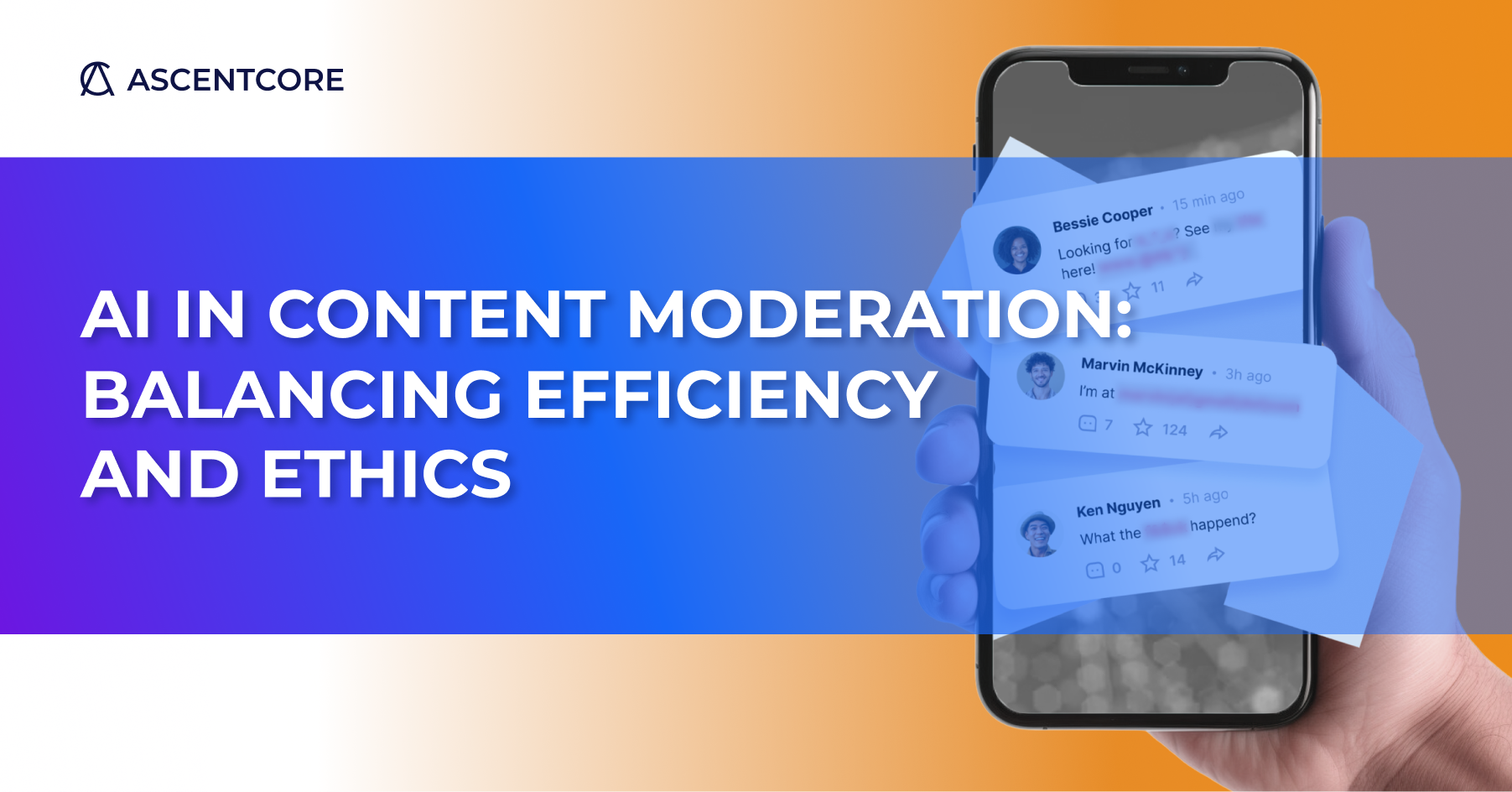AI technology can play a significant role in moderating content across various online platforms, from news outlets to social media sites to digital marketplaces. These tools can help by sifting through large volumes of user-generated content to identify and filter out inappropriate, harmful, or violating content. While AI has the potential to significantly enhance the efficiency of content moderation processes, it also brings about several challenges and ethical considerations that need careful consideration.
Keep reading as we dive into the role of AI in content moderation and the challenges to be aware of.
The Role of AI Algorithms in Content Moderation
Content moderation is crucial for maintaining safe and respectful online environments, whether on social media platforms, forums, online marketplaces, or other digital spaces. Here are some ways AI is involved in content moderation:
- Consistency. AI algorithms can help platforms better consistently apply predefined rules and guidelines to all content, minimizing the risk of biased or subjective decisions that might arise from human moderators.
- Efficiency. AI algorithms can aid humans in speeding up the review process by processing vast volumes of content in real-time. AI tools can flag potentially problematic material for human review and significantly reduce the workload on human moderators, allowing them to respond more quickly to new content.
- Scalability. As online platforms grow, so too does the amount of user-generated content that requires review and moderation. AI technology allows platforms a scalable solution to handle this growth efficiently without being hampered by an inability to keep up.
- Image and Video Analysis. Content moderation doesn’t consist only of watching out for written content; it also includes photos and videos. AI-powered tools can scan images and videos for explicit, graphic, or violent content, which helps prevent the spread of harmful visual content.
- Content Categorization. Sorting and categorizing content can help moderators manage their workload and consistently enforce platform policies. Unfortunately, this can also be a tedious and time-consuming task that takes away from more critical work. Luckily, AI tools can help categorize content into different classes (e.g., political, adult, violent), allowing employees to spend their time on more strategic tasks.
Challenges and Considerations of AI in Content Moderation
While AI can play a significant role in helping humans better moderate their platforms, it’s important to be aware of a few pitfalls.
- Freedom of Speech: Striking the balance between curbing harmful content and upholding freedom of speech is complex and requires human oversight. Overzealous content moderation could stifle legitimate conversations and leave a platform open to liability.
- Adversarial Behavior: Bad actors can find ways to trick AI systems by altering content just enough to evade detection, which requires frequent updates to the algorithms and learning models.
- False Positives and Negatives. AI algorithms may struggle to accurately distinguish between context, satire, and actual harmful content, leading to both false positives (legitimate content flagged incorrectly) and false negatives (problematic content that’s not flagged).
- Bias and Fairness. AI algorithms can inherit biases present in the training data, potentially leading to discriminatory outcomes, such as disproportionately flagging content from certain groups of people or types of content.
- Transparency. Users might demand transparency regarding content moderation practices, including the role of AI algorithms, to better understand why and how certain content gets flagged (or not).
Overcoming these Challenges
While these challenges may seem overwhelming, there are strategies that organizations can employ to mitigate them.
- Hybrid Approach. Combining AI algorithms with human moderation can ensure that platforms are leveraging the efficiency of AI tools with the nuanced understanding of context and culture that humans bring.
- Continuous Learning. Just like human learning, AI models need regular updates and new knowledge to adapt to evolving content trends and emerging challenges. A “set it and forget it” mentality will just not work when it comes to AI algorithms.
- Explainability. Developing AI models that provide explanations for their decisions can help in understanding and rectifying errors. It can also help with staying transparent about how an AI tool is trained and help everyone understand how it arrives at its conclusions.
Tread Carefully into the Future
There’s no doubt that AI algorithms offer tremendous potential to enhance content moderation efficiency, but it’s also crucial to approach their deployment with careful consideration of the associated challenges and ethical implications. Striking a balance between efficiency and ethics will require ongoing collaboration between technologists, content platforms, policymakers, and society at large.
If you’re curious to learn how AI technology could help your business, check out our use case or reach out to AscentCore. With a focus on AI and ML, we deliver transformational results for our clients by leveraging the latest technology and empowering companies to disrupt, transform, accelerate, and scale.



